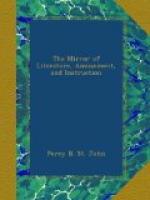The author of Hervey’s Meditations, when on his sick bed, observed that his time had been too much occupied in reading the historians, orators, and poets of ancient and modern times; and that were he to renew his studies, he would devote his attention to the Scriptures.
The last words which the eminent physician Haller addressed to his medical attendant expressed the calm serenity of his mind. “My friend,” said he, laying his hand on his pulse, “the artery no longer beats.”
M. De La Harpe, one of the first literary characters of the last century, who for many years laboured to spread the principles of the French philosophy, but afterwards became a most strenuous defender of Christianity, on the evening preceding his death was visited by a friend. He was listening to the Prayers for the Sick; as soon as they were concluded, he stretched forth his hand and said—“I am grateful to Divine mercy, for having left me sufficient recollection to feel how consoling these prayers are to the dying.”
Cardinal Wolsey, when dying, by slow progress and short journeys, reached Leicester Abbey. He was received with the greatest respect. His only observation was, “Father Abbot, I am come to lay my bones among you.” He died three days after, with, great composure and fortitude. He said, shortly before his death—“Had I but served my God as diligently as I have served the king, he would not have forsaken me in my grey hairs; but this is the just reward I must receive for my pains and study, in not regarding my service to God, but only to my prince.”
Melancthon, a few days before his death, although extremely debilitated, delivered his usual lecture. At the termination of it, he said, impressively—“I am a dying man, and these are the three subjects for intercession with God, which I leave to my children and their little ones—that they may form part of his church, and worship him aright—that they may be one in him, and live in harmony with each other—and that they may be fellow-heirs of eternal life.” The day before his death, he addressed some present—“God bestows talents on our youth, do you see that they use them aright.” While dying, his friends discerned a slight motion of the countenance, which was peculiar to him when deeply affected by religious joy.
W.
* * * * *
THE NOVELIST.
OSMYN AND ZAMBRI.
A Persian Tale. From the French.
(From a Correspondent.)
A worthy old Persian having arrived at the end of an irreproachable life, experienced in his last moments the greatest uneasiness for the fate of his two sons, whom he was about to leave without fortune, without a livelihood, and without a prospect. The elder called Osmyn, was twenty years of age, and the younger, eighteen, bore the name of Zambri.
As the old man drew near his last hour, he thought much less of his own sufferings than of the fate of his children, when his ear was agreeably struck with a soft and melodious voice, which said to him, “Fear nothing, old man, I will watch over your children; die in peace as thou hast lived. I bring a present for each of your sons; let them make good use of it, and one day perhaps they may be re-united, and live in happiness.”




